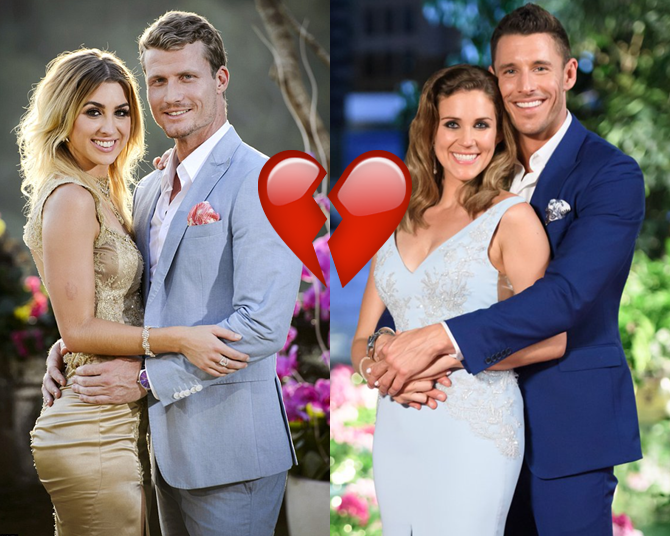
AFTER THE FINAL ROSE: Does The Bachelor & Bachelorette Need To Return To Its Roots?
Another year, another two seasons of The Bachelor and The Bachelorette under wraps.
The 2016 programs were noticeably different to those prior, and had fans increasingly angered by the frustrating and misleading dynamics of the series.
Those watching were seeing a disconnect between who we saw a connection with, and the person that ended up winning in the end. We also met people that seemed more keen on getting their mug on TV, than actually finding love. The two seasons have not only broken the hearts of the contestants – but the viewers as well, present company included. I felt betrayed by the seasons more so than the people being portrayed.
In an effort to cling to the franchise that I hold so dear, I went back to the start and watched the very first season of the US series to see where we got it all wrong.
Biggest upset since that historic time Nikki got dumped 6 weeks ago #BacheloretteAU pic.twitter.com/TmBHaNpLbo
— Áine Ryan (@AineFRyan) October 27, 2016
With terms like ‘rose ceremony‘, ‘group-date‘ and ‘hometowns‘ now part of our everyday vernacular, it’s difficult to fathom that Australia was relatively late to the cocktail party.
If we cast our memories back before the six Australian series, two engagements, over 20 international versions, thousands of roses and go back to season one of the franchise in the series’ premier in 2002.
Oh boy, was it different.
The bachelor in question, Alex Michel, was nothing unusual. He was a tall, dark and handsome, he was successful, well-spoken but spineless enough to bend to the producers direction.
14 years ago today, first Bachelor Alex Michel entered in to a relationship with Amanda Marsh on national television! ????
— Bachelor Nation (@BachelorNation6) April 25, 2016
But the series was much shorter, and without the lavish dates and travel that has become synonymous with the show. The relationships in the Bachelor today are compounded by the glitz, the glam and the unrealistic and can’t be matched outside of the competition when they face the challenges thrown up by true ‘reality’. At first, this wasn’t the case.
But the most remarkable difference was the dynamic of the competition – it was a mutual exchange on an even playing field.
There wasn’t so much pressure to fall for the Bachelor or Bachelorette, just as the chosen bachy didn’t have to fall for everyone of the contestants. This was demonstrated, at the very first rose ceremony when host Chris Harrison told all the contestants:
“By offering you a rose, he’s asking you to stay with the show. But I need to remind you right now, that you are totally empowered here. You don’t have to accept his invitation.
If you don’t think that the bachelor is someone you might end up marrying or want to marry, you can reject his invitation and prepare to leave the show,” said Harrison.

This part of the speech was fazed out over time, and certainly never made it to the lips of Osher Gunsberg. It’s a very far-cry from the current dynamics.
In the first ceremony, there was a mutual understanding between the bachy and contestants, one which lifted the pressure for all the women to fain affection, when they just weren’t feeling it. Even the contestants critiqued the process of finding love on he show and explained how it made them feel:

The show was honest about putting contestants into a simulated enviroment where every action was being filmed by a camera crew. It brought to life all the raw, awkward and harsh emotions that went with this process. We loved it.
Alex even told Obsessed TV at the time, that he couldn’t figure out if the women liked him back as much as he liked them. This dynamic is underplayed in the Aussie version.
Are we really meant to buy that every single one of the 22 women entering the competition was head-over-heels for Richie ‘Cool Bananas‘ Strahan?
Encouraging transparency may have meant that the likes of The Bachelor’s Olena Khamula, and The Bachelorette’s Courtney Dober, could feel they could walk away early on. While the two were favourites by each respective leading man and lady, it became evident as weeks past that perhaps they weren’t as invested in their relationships.
They tried to make a bogan suave. So many sleezy moments. I think many identified best with Olena's disinterest #BachelorAU
— carry on kat (@katnco85) September 15, 2016
I don't get why Olena didn't leave weeks ago. She didn't even like Richie #bachelorau
— Simi West (@simwest7) September 14, 2016
They both expressed their doubts, to the disdain of each bachy and only lasted as long as they could hold back their true feelings. After going all the way to the final three, Olena told the Herald Sun after her eviction, that she was actually actively trying to talk Richie out of taking her into the final two, saying:
“I couldn’t say ‘I love you’ because I didn’t have those feelings for him and I wasn’t going to lie just to win it … I knew where it was going,” she said.
Within the franchise, every contestants feelings should be equally measured. Just as the bachelor can say they don’t have feelings for a one out of the bunch, the contestants should be able to say the same. On the first season of the Australian Bachelor, contestant Emma left and all she could say was:
“I feel like there’s a lot of girls here who are really, really into this, and really here for the right reasons, and I just feel like I’m not fully here,” she said at the time.
Will never be able to trust Channel 10 with my feelings again…just joking, like an idiot I'll probs be back next season. #BacheloretteAU pic.twitter.com/2yrd744quq
— Melissa Loy (@esl_mel) October 27, 2016
In other words, she probably wasn’t all that interested in first season bachelor Tim Robarbs. These contestants should be able to say that, long before the final rose.
When Blake Garvey chose Sam Frost in the second season finale, it soon became crystal clear, he was not acting out his true feelings.
Taking the franchise back to the roots would not only be fairer but would be drama-packed. If everyone is free to express their feelings, they will no longer feel stuck following the stream within the bachelor canon.
In season 11 of the American version, bachelor Brad Womack did the unimaginable. At the final rose ceremony, he decided to choose no one, sending both women home and leaving the competition still single. He later justified his actions by saying he hadn’t fallen in love with either woman and was just telling his true feelings.
The drama that could come from simple honesty is mouth-watering.
Enough of the twists and tricks, let’s just start telling it how it is, saving every one time and potential heartache.
